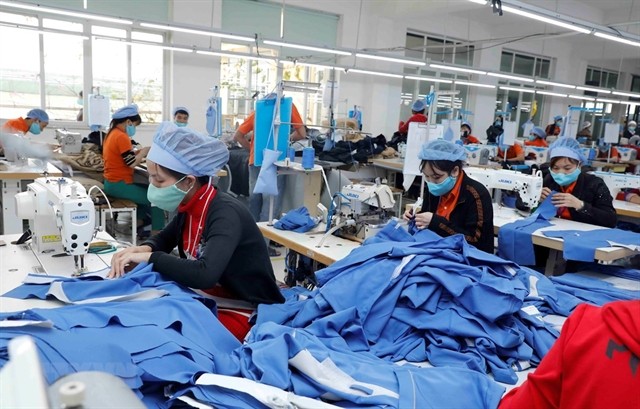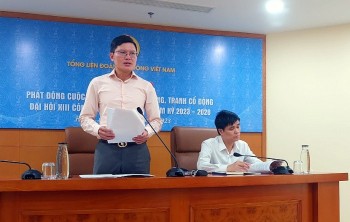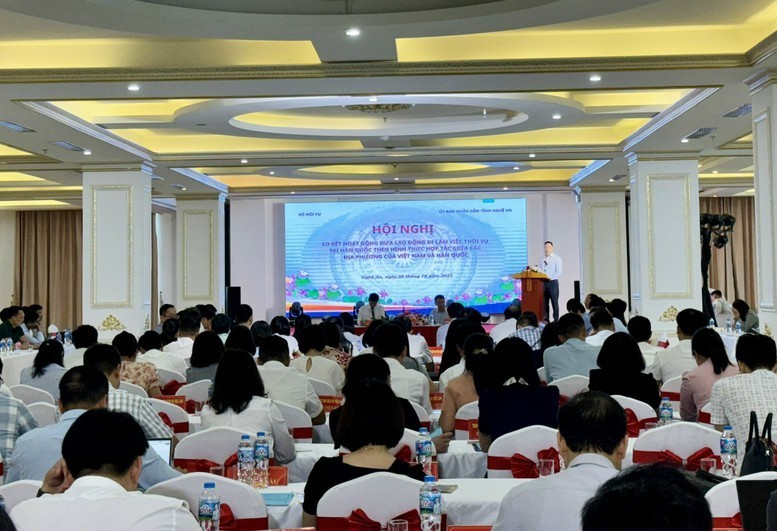WEF Report Forecasts Big Changes in Labour Market
69 million new jobs will be created and 83 million eliminated by 2027; fastest-growing jobs are AI and Machine Learning Specialists, Sustainability Specialists, Business Intelligence Analysts and Information Security Specialists, Bussines Today citied the World Economic Forum's report.
 |
| Workers during a shift at a textile company in the northern province of Hung Yen. Photo: VNS |
The Future of Jobs Report 2023, released on Monday, suggested that almost a quarter of jobs (23% to be precise) are expected to change in the next five years through growth of 10.2% and decline of 12.3%.
| This is the fourth edition of the report, which was first launched in 2016. It aims to analyse how macrotrends as well as technology adoption are likely to reconfigure labour markets and shape the demand for jobs and skills in the 2023-2027 timeframe. The Future of Jobs Survey brings together the perspective of 803 companies – collectively employing more than 11.3 million workers – in 27 industry clusters and 45 economies from all world regions. |
According to the estimates of the 803 companies surveyed for the report, employers anticipate 69 million new jobs to be created and 83 million eliminated among the 673 million jobs corresponding to the dataset, a net decrease of 14 million jobs, or 2% of current employment.
Macrotrends, including the green transition, ESG standards and localisation of supply chains, are the leading drivers of job growth, with economic challenges including high inflation, slower economic growth and supply shortages posing the greatest threat. Advancing technology adoption and increasing digitisation will cause significant labour market churn, with an overall net positive in job creation, the report said.
“For people around the world, the past three years have been filled with upheaval and uncertainty for their lives and livelihoods, with Covid-19, geopolitical and economic shifts, and the rapid advancement of AI and other technologies now risks adding more uncertainty,” said WEF Managing Director Saadia Zahidi.
“The good news is that there is a clear way forward to ensure resilience. Governments and businesses must invest in supporting the shift to the jobs of the future through the education, reskilling and social support structures that can ensure individuals are at the heart of the future of work.”
While technology continues to pose both challenges and opportunities to labour markets, employers expect most technologies to contribute positively to job creation.
The fastest growing roles are being driven by technology and digitalisation. Big data ranks at the top among technologies seen to create jobs, with 65% of survey respondents expecting job growth in related roles. The employment of data analysts and scientists, big data specialists, AI machine learning specialists and cybersecurity professionals is expected to grow on average by 30% by 2027.
 |
| Illustrative image. |
Training workers to utilise AI and big data will be prioritised by 42% of surveyed companies in the next five years, ranking behind analytical thinking (48%) and creative thinking (43%) in importance. Digital commerce will lead to the largest absolute gains in jobs: approximately 2 million new digitally enabled roles are expected, such as e-commerce specialists, digital transformation specialists, and digital marketing and strategy specialists.
At the same time, the fastest declining roles are also being driven by technology and digitalisation, with clerical or secretarial roles including bank tellers, cashiers and data entry clerks expected to decline fastest.
The Future of Jobs Report 2023 suggested that tasks are seen as no more automated now than they were three years ago when the report was last published. About a third of tasks (34%) are currently automated, just 1% above the 2020 figure. Surveyed companies also revised down their expectations for further automation, to 42% of tasks by 2027, compared to 2020 estimates of 47% of tasks by 2025.
But while expectations of the displacement of physical and manual work by machines has decreased, reasoning, communicating and coordinating – all traits with a comparative advantage for humans – are expected to be more automatable in the future.
Artificial intelligence, a key driver of potential algorithmic displacement, is expected to be adopted by nearly 75% of surveyed companies and is expected to lead to high churn – with 50% of organizations expecting it to create job growth and 25% expecting it to create job losses.
Investment in the green transition and climate-change mitigation, as well as increasing consumer awareness of sustainability issues are driving industry transformation and opening new opportunities in the labour market.
The strongest net job-creation effects are expected to be driven by investments that facilitate the green transition of businesses, with more than half of respondents expecting it. As countries seek more renewable energy sources, roles including renewable energy engineers and solar energy installation and systems engineers will be in high demand.
Investment will also drive growth in more generalist sustainability roles, such as sustainability specialists and environmental protection professionals, which are expected to grow by 33% and 34% respectively, translating to growth of approximately 1 million jobs.
However, the largest absolute gains in jobs will come from education and agriculture. The report finds that jobs in the education industry are expected to grow by about 10%, leading to 3 million additional jobs for vocational education teachers and university and higher education teachers.
Jobs for agricultural professionals, especially agricultural equipment operators, graders and sorters, are expected to see a 15%-30% increase, leading to an additional 4 million jobs, report said.
 | Four Areas that Malaysian Investors are Keen on to Collaborate with Vietnam “Malaysian investors are keen on future collaboration with Vietnamese counterparts in areas of high potentials, such as agriculture, aquaculture, processed products, and electronic products and ... |
 | Logos and Posters Contest for the 13th Congress of Vietnam General Confederation of Labor The logos and posters designing contest for the 13th Congress of Vietnam General Confederation of Labor will accept entries from April 5 to May 5, ... |
 | A Safe and Healthy Working Environment is A Fundamental Principle and Right at Work On the occasion of "World Fay for Health and Safety at Work" (April 28), the Regional Director of The International Labour Organization (ILO) for Asia ... |
Recommended
 Viet's Home
Viet's Home
From Village to Lecture Hall to Learn “Code”
 Viet's Home
Viet's Home
FAVIJA and Japanese Students Donate Wheelchairs to Persons with Disabilities in Vietnam
 Expats in Vietnam
Expats in Vietnam
Foreigners Satisfied with Cost of Living in Vietnam
 Expats in Vietnam
Expats in Vietnam
Vietnamese Tet - Where “Friends from Afar” Find a Sense of Belonging
Popular article
 Viet's Home
Viet's Home
Ho Chi Minh’s Legacy in the Land of Roses - Bulgaria
 Viet's Home
Viet's Home
Vietnam Continues to Work with UNESCO to Safeguard Cultural Diversity in the Digital Era
 Viet's Home
Viet's Home
Inviting Ancestors Home for Tet
 Viet's Home
Viet's Home







